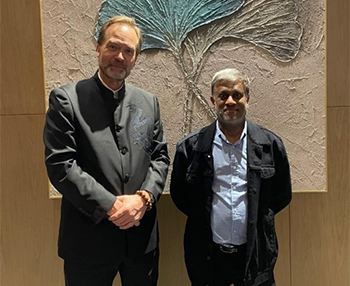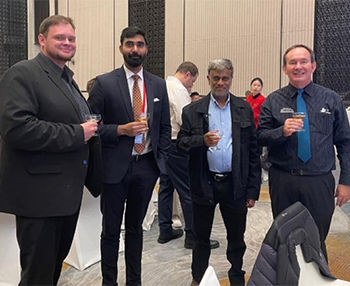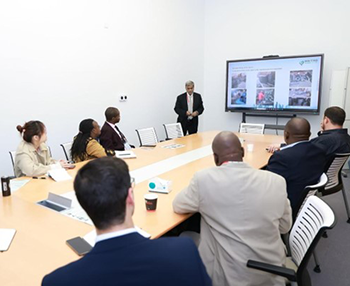The Faculty of Engineering at the North-West University (NWU) participated in the World Association of Industrial and Technological Research Organizations (WAITRO) Summit 2024, which took place in Nanjing, China from 13 to 15 November.
The summit’s theme, “From innovation to impact: Strategies for sustainable solutions”, highlighted the importance of connecting innovation with market demands to foster sustainable development.
The summit brought together more than 200 representatives from nearly 40 countries, including the United States, Germany, Denmark, Australia, Turkey, South Africa and Belgium. They exchanged perspectives on industrial and technological innovation, technology transfer, industrial upgrading, green technology and sustainable development.
A central topic of discussion among the experts was the application of China's experience to support the least developed countries.
Sub-Saharan Africa featured prominently through the participation of Prof Raj Siriram, director of business development and stakeholder engagement of the Faculty of Engineering. He leads WAITRO’s Regional Focal Point (RFP) for Sub-Saharan Africa, which has a special interest group called “Technology and innovation: A catalyst for an entrepreneurial environment”.
The primary objective of the Africa Special Interest Group (SIG) is to promote collaboration within the region to enhance the commercialisation of technology, and to lay a strong foundation for innovation-driven entrepreneurship within the region.
Reducing household air pollution
Prof Siriram facilitated a session in which SIG members from Sub-Saharan Africa identified several key priority areas for further development, including low-emission clean cooking stoves, renewable energy solutions and waste management strategies, among other pertinent issues.
The aim of identifying these key priority areas is to enhance the quality of life in low-income communities by reducing household air pollution.
Prof Siriram presented ongoing research at the NWU and facilitated a productive dialogue with participants from Kenya, Uganda and the Philippines. They discussed the efforts being undertaken in various regions to combat household air pollution while identifying opportunities to leverage existing research and expertise to expedite progress.
Furthermore, the dialogue highlighted the significance of regional and international collaboration in fostering innovation and improving the quality of life for residents in low-income communities.
“The NWU actively engaged with fellow WAITRO members during the summit, cultivating meaningful connections that enhance global collaboration and bridge regional and international efforts,” says Prof Siriram.
These interactions have progressed to further discussions with Dr Hamesh Avireddy from the Leitat Technology Centre in Spain; Prof John Allport from the University of Huddersfield in the United Kingdom; and Prof Lloyd Townley from Nanjing Tech University in China.
Summing up the NWU’s contribution to the event, he says: “As representatives of the NWU, we made significant contributions to essential discussions that align with both regional and global priorities.”
WAITRO’s place in the world of innovation
WAITRO is an independent, non-governmental and non-profit association established in 1970 under the auspices of the United Nations. It serves as a global platform that unites stakeholders in science, technology and innovation, including research and technology organisations and universities. It facilitates international collaboration by providing mechanisms for members and partners to connect, form partnerships, exchange knowledge, inspire innovation and amplify their efforts. Through these initiatives, WAITRO contributes to addressing global challenges and advancing the United Nations Sustainable Development Goals.

Prof Raj Siriram with WAITRO secretariat Dr Paul Burrows.

From left are Prof Henri Marais (NWU), Dr Hamesh Avireddy (Leitat Technology Centre), Prof Raj Siriram (NWU), and Prof LJ Globler (NWU).

Prof Raj Siriram presents ongoing research at the NWU on improving the quality of life of low-income communities by reducing household air pollution using low emission, semi-continuous coal stoves.
